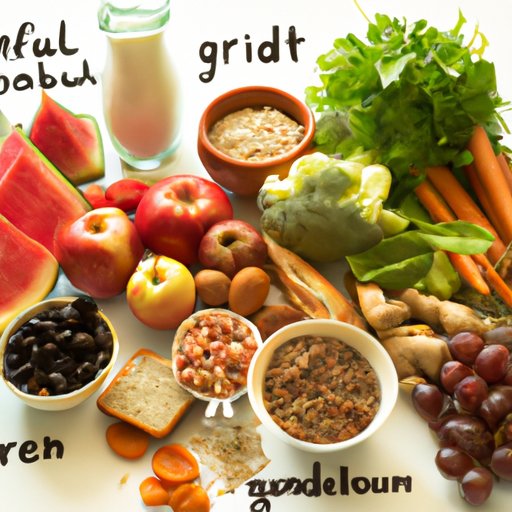Introduction
The debate about what type of food is best to eat has been ongoing for centuries, with people from all walks of life looking for ways to improve their overall health and wellbeing. With so many different opinions and theories out there, it can be difficult to know which type of food is actually beneficial. This article will explore the nutritional benefits of different types of foods, the differences between traditional and modern diets, the advantages of eating organic and locally-sourced foods, the pros and cons of vegetarian, vegan, and meat-based diets, the effects of processed and fast food on our bodies, and the impact of diet on mental and physical health.

Breakdown of Nutritional Benefits of Different Types of Foods
When it comes to good nutrition, the key is to eat a balanced diet that includes a variety of healthy foods. Fruits and vegetables are packed with essential vitamins and minerals, and should make up a large portion of your diet. Whole grains provide important dietary fiber and complex carbohydrates, while dairy products offer calcium and other essential nutrients. Protein sources like lean meats, eggs, beans, and nuts are also important for maintaining health and strength. It’s important to remember that no single food contains all of the necessary nutrients, so it’s important to include a variety of foods in your diet.
Comparison of Traditional Versus Modern Diets
Traditional diets were more focused on whole, unprocessed foods, such as fruits, vegetables, whole grains, and proteins. These diets were often low in saturated fat and high in fiber, which helped to protect against chronic diseases like heart disease, diabetes, and cancer. Traditional diets were also rich in antioxidants, which help to protect cells from damage and may reduce the risk of certain illnesses. Additionally, traditional diets typically included fermented foods, which are thought to have probiotic benefits and help to promote digestive health.
Modern diets, on the other hand, are often higher in processed and fast foods, and lower in fresh produce, whole grains, and proteins. These diets tend to be higher in unhealthy fats, sugars, and sodium, and lower in essential vitamins and minerals. Additionally, modern diets often contain fewer probiotic foods, which can negatively affect digestive health.
Examining the Health Benefits of Eating Organic and Locally-Sourced Foods
Organic and locally-sourced foods are becoming increasingly popular, and for good reason. Organic foods are grown without the use of synthetic fertilizers, pesticides, or herbicides, and are not genetically modified. This means that they are free from harmful chemicals, and may contain higher levels of essential vitamins and minerals than conventionally grown produce. Locally-sourced foods are also beneficial, as they are usually fresher and contain fewer preservatives. Additionally, buying local helps support local farmers and businesses.
Examining the Pros and Cons of Vegetarian, Vegan, and Meat-Based Diets
Vegetarian and vegan diets are plant-based diets that exclude animal products. These diets are generally considered to be healthy, as they are typically lower in saturated fat and cholesterol, and higher in fiber, vitamins, and minerals. Additionally, they are associated with a reduced risk of certain illnesses, such as heart disease and diabetes. However, it is important to note that these diets may be deficient in certain nutrients, such as vitamin B12 and iron, so supplementation may be necessary.
Meat-based diets are those that include animal products, such as beef, poultry, fish, and eggs. These diets can be healthy if the right cuts of meat are chosen, and if they are accompanied by plenty of fruits, vegetables, and whole grains. Studies have shown that meat-based diets can be beneficial for muscle growth and repair, and for providing essential vitamins and minerals. However, these diets can also be high in saturated fat and cholesterol, so it is important to choose lean cuts of meat and to limit consumption.

Exploring the Effects of Processed and Fast Food on Our Bodies
Processed and fast foods are convenient, but they are often high in calories, saturated fat, sugar, and sodium. These foods can lead to weight gain and an increased risk of certain illnesses, such as heart disease and diabetes. Additionally, processed and fast foods lack essential nutrients, such as vitamins, minerals, and fiber, which are necessary for optimal health. For these reasons, it is important to limit consumption of these types of foods.

Investigating the Impact of Diet on Mental and Physical Health
It is well-known that diet plays an important role in physical health, but it is also important for mental health. Eating a nutritious diet can help to improve mood, reduce stress, and increase energy levels. Certain nutrients, such as omega-3 fatty acids, B vitamins, and magnesium, are especially important for mental health. Additionally, avoiding processed and fast foods and consuming plenty of fresh fruits and vegetables can help to keep your mind and body healthy.
Conclusion
Eating a balanced diet is essential for optimal health and wellbeing. It is important to include a variety of healthy foods in your diet, such as fruits and vegetables, whole grains, dairy products, and proteins. Additionally, traditional diets are associated with numerous health benefits, and organic and locally-sourced foods can be beneficial for both nutrition and the environment. Vegetarian, vegan, and meat-based diets each have their own pros and cons, and it is important to limit consumption of processed and fast foods. Finally, diet plays an important role in mental and physical health, and certain nutrients are essential for optimal mental health. By following these guidelines, you can ensure that you are getting the nutrients you need for a healthy lifestyle.
(Note: Is this article not meeting your expectations? Do you have knowledge or insights to share? Unlock new opportunities and expand your reach by joining our authors team. Click Registration to join us and share your expertise with our readers.)
